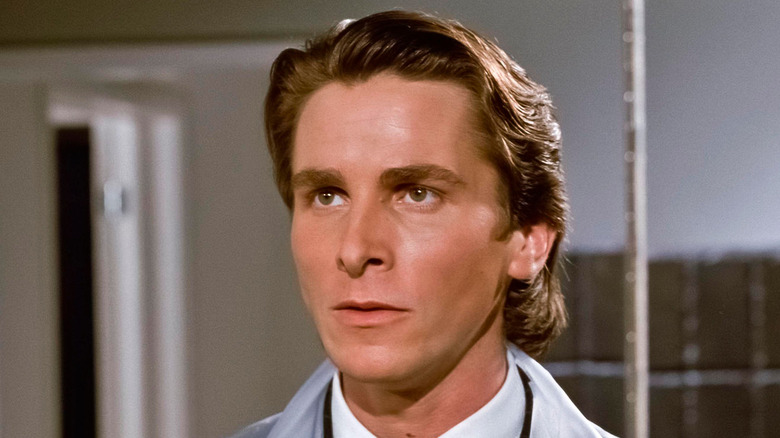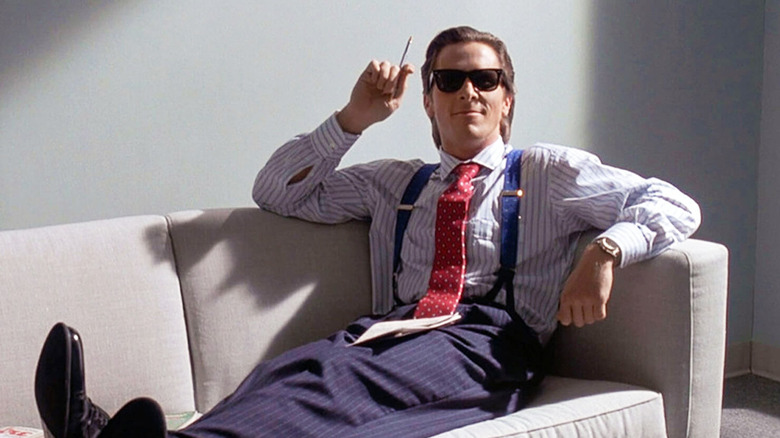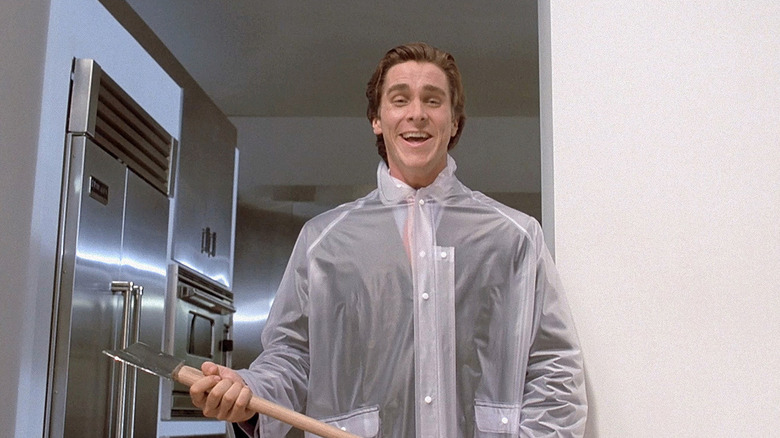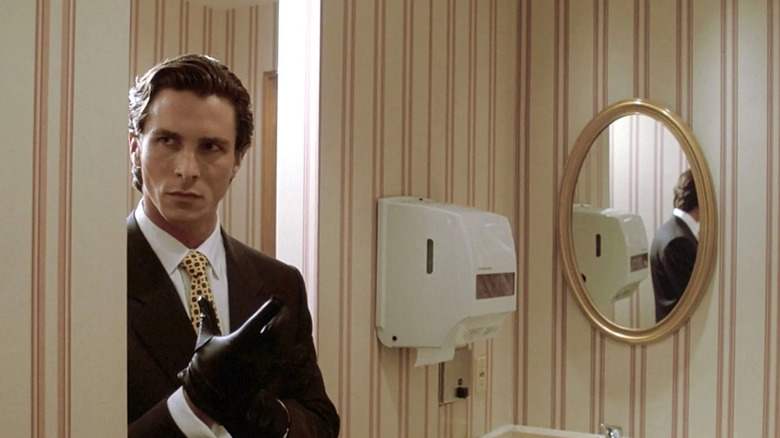Christian Bale Was Warned American Psycho Would End His Career
Playing a famous character in a horror movie can be a mixed blessing for an actor's career. It never did Sir Anthony Hopkins any harm, who picked up his first Best Actor Oscar for less than 20 minutes onscreen as Hannibal Lecter in "The Silence of the Lambs," but many others haven't fared so well. Anthony Perkins made plenty of films after "Psycho" but he never escaped the shadow of Norman Bates, reprising the role in three sequels before he passed away in 1992. Linda Blair never reached the heights of "The Exorcist" again and suffered the indignity of "Repossessed," a woeful spoof with Leslie Nielsen. Meanwhile, Robert Englund, whose distinctive features were still prominent behind the burn makeup of Freddy Krueger in the "A Nightmare on Elm Street" franchise, was trapped in a cycle of typecasting in bad horror flicks like "Strippers vs Werewolves" and "Funhouse Massacre."
A similar fate potentially awaited any actor daring enough to take on the role of Patrick Bateman in "American Psycho." The pitch-black satire from Bret Easton Ellis caused plenty of controversy on its first publication in 1991, mostly thanks to its lengthy passages describing grotesque acts of abuse, torture, murder, and dismemberment in nauseating detail. It was a tough read, and the hullabaloo surrounding the extreme and graphic violence overshadowed its deadpan skewering of consumerism, toxic masculinity, and '80s yuppie culture, as well as flagging the novel as one of those "unfilmable" books.
The negative reaction didn't stop Lionsgate Films from putting an adaptation into production, much to the dismay of people protesting against its misogynistic horrors. In the face of such backlash against the movie long before it hit our screens, who could successfully play a monster like Patrick Bateman? The answer was Christian Bale, although he was warned that the role could prove disastrous for his career.
Casting Patrick Bateman in American Psycho
Patrick Bateman in "American Psycho" is one of the great horror characters of any era, one that perfectly summed up the "Greed is Good" ethos of the '80s. With his anonymous job on Wall Street, conspicuous wealth and materialism, and complete lack of human empathy, Bateman was the man for his time and place. When it comes to the film adaptation in 2000, he also foreshadowed the modern phenomenon of FOMO. Preoccupied with securing reservations at the trendiest Manhattan eateries and waxing lyrical about the most mainstream pop imaginable, his desperation to win acceptance in an environment where he is often mistaken for other financial drones is palpable.
Johnny Depp was interested in the role as early as 1992, but by the time director Mary Harron first landed the gig several years later, Leonardo DiCaprio was the name on everyone's lips. Harron always had Christian Bale in mind for the part, but he wasn't in the studio's plans at all. Conversely, Harron absolutely did not want DiCaprio:
"Leonardo wasn't remotely right [for the part]. There's something very boyish about him. He's not credible as one of these tough Wall Street guys... I did not want to deal with someone who had a 13-year-old fan base. They shouldn't see the movie. It could've gotten us in a lot of trouble."
Although DiCaprio would later portray another Wall Street monster in "The Wolf of Wall Street," he patently wasn't right for the role at that stage of his career. That didn't concern the studio, however, who announced him in the lead to Harron's disapproval. Her refusal to meet with DiCaprio resulted in her getting dumped from the project as a list of other prospective directors was drawn up. Several including Danny Boyle, Martin Scorsese, David Cronenberg, and Stanley Kubrick were considered before Oliver Stone took over.
Christian Bale was warned that American Psycho could harm his career
The combination of Oliver Stone and Leonardo DiCaprio didn't work out, and Mary Harron got "American Psycho" back. She also got to cast her preferred leading actor, Christian Bale, who had turned down other roles for nine months in the hope that he'd still get a crack at playing Patrick Bateman.
It was a make-or-break part for Bale. Before "American Psycho," he was best known for his breakthrough role as a 13-year-old in "Empire of the Sun" and for playing journalist Arthur Stuart in Todd Haynes' glam rock musical drama "Velvet Goldmine." Although he had grabbed the public's attention at a similar age to his Bateman rival Leonardo DiCaprio, he hadn't quite hit the same heights of fame. That didn't stop people from warning against him taking the part of the murderous yuppie in "American Psycho."
"I had an awful lot of calls saying it was going to be career suicide ... a lot of people would talk about Anthony Perkins in 'Psycho' and say once you play a villain like that you never get to play anything else, because you're stuck in everyone's imagination as that person."
In the end, Harron's faith in Bale paid off. "American Psycho" was a modest box office success and critics were generally positive, in particular praising Bale's performance; Roger Ebert noted:
"Christian Bale is heroic in the way he allows the character to leap joyfully into despicability; there is no instinct for self-preservation here, and that is one mark of a good actor."
Wisely, Harron toned down the violence and brought the satire to the fore, which has helped the film's enduring cult legacy. Although it is set in the '80s, it still very much speaks to today's shallow infatuation with wealth and fragile masculinity.
Playing Patrick Bateman had the opposite effect on Christian Bale's career
Christian Bale has revealed that he never had any doubt that playing Patrick Bateman was a great opportunity, dismissing warnings that the role could be harmful to his career. He astutely identified the ridiculousness of the monstrous yuppie's character, saying:
"He's certainly not somebody that I would want to be at a table eating with, but I'd certainly want to eavesdrop on his conversation."
I've never been a massive Christian Bale fan in general, but his performance in "American Psycho" is one of my all-time favorites. Ever the method actor, he followed a strict fitness regime to get himself in incredible shape for the role and stayed in character throughout the shoot, only dropping Bateman's American accent after the film wrapped. The hard work paid off as he totally nailed the character's preening narcissism, nerdy obsessiveness, and twitchy desperation as he finds himself in absurd situations trying to cover his tracks. He's also extremely funny in the role too, as the meme-worthy "Hip To Be Square" scene and the epic business card standoff proved.
Rather than damage his future prospects or doom him to typecasting, "American Psycho" had the opposite effect on Bale's career. In some respects, it was like his second Hollywood breakthrough, leading to parts in action movies like "Reign of Fire," "Equilibrium," and earning acclaim for his intense performance in "The Machinist." His rising stardom then earned him the coveted role of Bruce Wayne in "The Dark Knight Trilogy," to which he brought a certain Batemanesque smarm and insecurity. Now Bale is an established A-lister, which just goes to show that playing a serial killer doesn't have to be a career killer.



